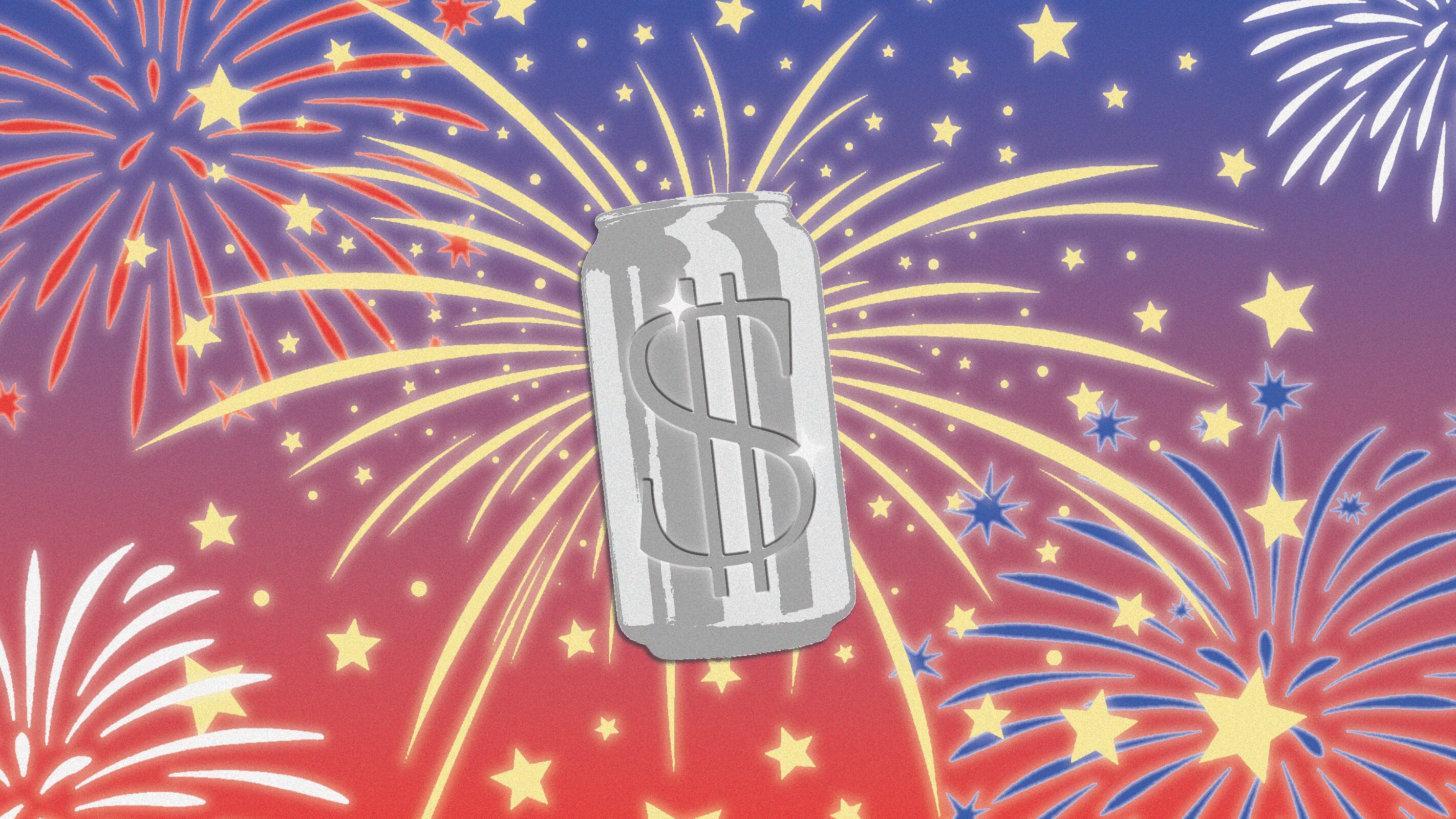The Fourth of July is the quintessential beer holiday. Poppin’ tops on the Fourth is about as American as hot dogs, apple pie, and perhaps Independence Day itself. But take a closer look at that local craft brew sweating in your hand at this weekend’s neighborhood barbecue: Chances are that the aluminum can’s journey from Canada to brewery to your fingertips has been a serious headache for the past few years, with no signs of slowing down.
On June 3, President Donald Trump increased the tariff on steel and aluminum imports from 25% to 50% (the second rise of the year) in an effort to strengthen domestic production of those products. The catch: Much of the aluminum for U.S. beer cans comes from Canada, so the jack in tariffs immediately caused concern for craft breweries of every size.
“It’s this chaos right now of not knowing where prices are going and how to plan ahead of time,” says Sam Pecoraro, brewmaster of Von Ebert Brewing, with three locations in the Portland area. “Do we stock up and buy way, way more cans? If everyone does that, then nobody can order cans because the printers are going to be way behind with the labels.”
To answer his own question, though: yes. Von Ebert, among other breweries interviewed, is stocking up in response to aluminum market tumult. Trump first set a 10% tariff on aluminum back in 2018, the year Von Ebert was founded.
Back then, breweries weren’t quite as dependent on cans. That’s a hangover from the pandemic, which temporarily shuttered taprooms and forced brewers to ramp up canning in a hurry so that their newly homebound customers could buy six-packs at the grocery store. That resulted in what the media and beer industry dubbed the “candemic”—a pandemic-induced beer can shortage. Tack on a few years of inflation, employee shortages, and a decrease in beer drinkers overall, and the new Trump tariff is just the latest twist in an exhausting narrative.
In the short term, Von Ebert plans to absorb the new aluminum prices. “But on a long-term basis, I don’t see how prices to the consumers couldn’t increase,” Pecoraro says.
The Fourth of July is the top beer-selling holiday of the year, according to the Brewers Association. Beer sales increase by 25% the week of Independence Day, and a brewery can expect 4.9% of annual sales to occur within the two weeks surrounding the holiday. Craft beer sales in general were down 4% in 2024 and 1% in 2023, according to the association, a trend continuing into 2025.
But drinkers aren’t crowding into bars and taprooms like they used to five or 10 years ago, and that’s translated to a necessary contraction in the industry. Young people especially are drinking way less. Sixty-two percent of adults under age 35 say they drink, down from 72% two decades ago, according to a 2023 Gallup poll. The Oregon Beverage Alliance found that the state has lost about 70 breweries, taprooms and brewpubs over the past two years. The 300 that remain are beholden to the almighty can.
Aaron Sarnoff-Wood is co-founder of 2 Towns Ciderhouse in Corvallis, one of the largest can purchasers in the state. 2 Towns will move about 1.5 million cases of ciders like Pacific Pineapple and Bad Apple throughout the Western U.S. this year. To keep up with that kind of quantity while being able to somewhat buffer against scarcity or price hikes, 2 Towns has built on-site storage facilities for a minimum of 3 million cans. That gets the brand through one month of production. 2 Towns has also installed a labeler so that, in a pinch, the company can buy blank silver cans and apply its own label in-house rather than have the vendor do it.
In 2020, “we went almost a year without being able to buy cans,” Sarnoff-Wood says. “If you are supposed to have those cans on the grocery store shelf, you just lost that business.”
Costs for 2 Towns ciders increased by about 30% overall in the past year, from things like packaging materials and fruit juice. The company has had to absorb a lot of the cost increases itself, but this fall, they will land on consumers with the price of cases going up by 3%.
Migration Brewing is also planning to eat the cost of the new tariffs in the short term, but the 25% hike hasn’t directly affected the Portland brewery yet, according to McKean Banzer-Lausberg, Migration’s CEO and co-founder. Migration relies on a mix of domestic and Canadian aluminum, having intentionally diversified its supply in the event this exact situation should arise. This moment feels similar to the 2018 increase, Banzer-Lausberg says, except his brewery is now far more dependent on six-pack sales and he’s now seven years into navigating a challenging market.
“The post-pandemic economy is already so disruptive that these types of moves rock the boat even more,” Banzer-Lausberg says. “2018, 2019, things weren’t perfect, but they were pretty stable in general—you layer on one tariff and it’s easier to absorb. But when the water is already pretty choppy, it can be tougher.”
Banzer-Lausberg hopes Portlanders will skip the can altogether and come drink draft beers at Migration’s summer pop-up pub on the third-floor, outdoor patio of the PacWest Center downtown.
Sam Pecoraro of Von Ebert, who also serves as president of the Oregon Brewers Guild, has a similar wish for bustling taprooms statewide. After all, the price of aluminum cans is only a problem if customers continue to buy beer only in the grocery store.
“If people come drink over our own counter in taprooms, then that helps us out a lot,” Pecoraro says. “Then, we can keep prices low.”

